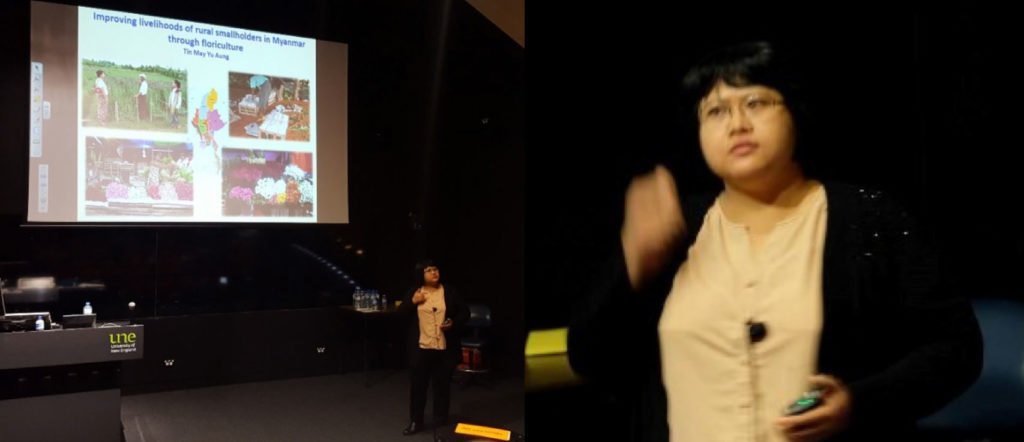

Preharvest and postharvest handling practices of flowers in Myanmar, TropAg
November 20, 2017
The Crawford Fund has generously partnered with TropAg2017 to assist 10 young researchers from developing countries attend and present their science at this international conference which will be held in Brisbane from 20-22 November 2017. Successful candidates were chosen by a selection panel made up of representatives of The Crawford Fund and the TropAg2017 conference organisers, based on submitted abstracts of their research.
In the lead-up to the conference we will be publishing short blog posts written by the young researchers about their work.
By Tin May Yu Aung, PHD Student, School of Environmentaland Rural Science, University of New England, and Lecturer, Department of Horticulture, Yezin Agricultural University.

I have recently commenced my PhD in the School of Environmental and Rural Science at the University of New England. I am a lecturer from the Department of Horticulture, Yezin Agricultural University (YAU), Myanmar. I am presenting two posters – my Master thesis and recent PhD research project in TropAg2017 Conference.
I accomplished my Master of Horticultural Science from YAU in 2011 with the thesis title on, “Preharvest and postharvest handling practices of some cut flowers in selected area of Myanmar”. In my country, flowers are widely utilized mainly for religious purpose to offer the Buddha. Recently, the floral decorations have gained popularity and consequently, the demand for cut flowers has been increasing in Myanmar. As cut flowers are perishable and limited in shelf life, there is approximately 23 – 48% of postharvest loss in Myanmar. Both production of high quality flowers and proper postharvest handling of flowers are important to have quality and prolong fresh life of cut flowers. Therefore, I conducted the household surveys along the cut flower value chain to examine the existing preharvest and postharvest operation and care practices of major cut flowers in Myanmar.
Now, fortunately, I received the Australian Award John Allwright Fellowship for PhD study at the University of New England. I thank the Australian Government to give me this chance to proceed my interest in floriculture area. In my PhD, I will continue my professional interests in floriculture by carrying out the research project on “Improving livelihoods of rural smallholders in Myanmar through floriculture”. Based on the knowledge gained from the surveys of my Master research, I noticed that flower production is one of the promising livelihood activities for smallholders in my country. With a small amount of land, farmers can earn high return by producing flowers. But there are little supports, both technical and material, from the government to the floriculture stakeholders. The agricultural policies in my country only focus on the production of staple foods, such as rice, pulses, and oilseed crops. Therefore, I would like to highlight the opportunities of the development of the floriculture sector in my country, and I would like to explore the ways to develop the flower industry in my country.
In fact, this is my first experience for attending and presenting in the international conference. So, I would like to thank the Crawford Fund for providing me to attend this conference. Hopefully, I can make new contacts and networks; I can share my knowledge and experience; and I can grasp new research idea and opinions from other international researchers to polish my PhD research project in this conference.




